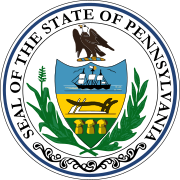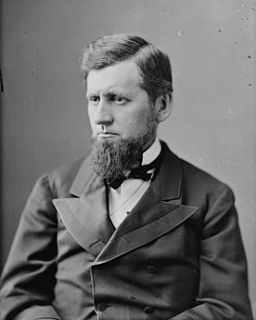Class I U.S. Senate election in Pennsylvania
The 1831 United States Senate special election in Pennsylvania was held on December 13, 1831. George M. Dallas was elected by the Pennsylvania General Assembly to the United States Senate. [1]
| Elections in Pennsylvania |
|---|
 |
The 1831 United States Senate special election in Pennsylvania was held on December 13, 1831. George M. Dallas was elected by the Pennsylvania General Assembly to the United States Senate. [1]
The Democratic-Republican Isaac D. Barnard was elected to the United States Senate by the General Assembly, consisting of the House of Representatives and the Senate, in December 1826. Sen. Barnard resigned on December 6, 1831, vacating the seat. [2]
Following the resignation of Sen. Isaac Barnard, the Pennsylvania General Assembly convened on December 13, 1831, to elect a new Senator to fill the vacancy. A total of eleven ballots were recorded. The results of the eleventh and final ballot of both houses combined are as follows:
| Party | Candidate | Votes | % | |
|---|---|---|---|---|
| Democratic | George M. Dallas | 67 | 50.38 | |
| Democratic | Joseph Hemphill | 34 | 25.56 | |
| Anti-Masonic | Richard Rush | 30 | 22.56 | |
| Democratic | Samuel B. Davis | 1 | 0.75 | |
| N/A | Not voting | 1 | 0.75 | |
| Totals | 133 | 100.00% | ||

The United States Senate elections of 1900 and 1901 were elections in which the Democratic Party gained two seats in the United States Senate, and which corresponded with President William McKinley's landslide re-election. By the beginning of the next Congress, however, the Republicans gained five additional seats, giving them a ten-seat majority.
The United States Senate elections of 1832 and 1833 were elections that had the Anti-Jacksonian coalition assume control of the United States Senate from the Jacksonian coalition, despite Andrew Jackson's victory in the 1832 presidential election.
The United States Senate elections of 1830 and 1831 were elections that had Jacksonians gain one seat in the United States Senate from the Anti-Jacksonian coalition, but lose one seat to the short-lived Nullifier Party. By the time Congress first met in December 1831, however, the Jacksonians had a net loss of one seat.

The 1788 United States Senate election in Pennsylvania, held on September 30, 1788, was the first United States Senate election held in Pennsylvania. The Pennsylvania General Assembly, consisting of the House of Representatives and the Senate, elected Pennsylvania's first two United States Senators, William Maclay and Robert Morris.

The 1794 United States Senate special election in Pennsylvania was held on March 31, 1794. James Ross was elected by the Pennsylvania General Assembly to the United States Senate.

The 1797 United States Senate election in Pennsylvania was held on February 16, 1797. Incumbent James Ross was re-elected by the Pennsylvania General Assembly to the United States Senate.

The 1808 United States Senate election in Pennsylvania was held on December 13, 1808. Michael Leib was elected by the Pennsylvania General Assembly to the United States Senate.

The 1814 United States Senate special election in Pennsylvania was held February 24, 1814. Jonathan Roberts was elected by the Pennsylvania General Assembly to the United States Senate.

The 1814 United States Senate election in Pennsylvania was held on December 10, 1814. Incumbent Jonathan Roberts was elected by the Pennsylvania General Assembly to the United States Senate.

The 1820-1821 United States Senate election in Pennsylvania was held on three separate dates from December 1820 to December 1821. On December 10, 1821, William Findlay was elected by the Pennsylvania General Assembly to the United States Senate.

The 1826 United States Senate election in Pennsylvania was held on December 12, 1826. Isaac D. Barnard was elected by the Pennsylvania General Assembly to the United States Senate.

The 1832-1833 United States Senate election in Pennsylvania was held on eleven separate dates from December 1832 to December 1833. On December 7, 1833, Samuel McKean was elected by the Pennsylvania General Assembly to the United States Senate.

The 1861 United States Senate special election in Pennsylvania was held on March 14, 1861. David Wilmot was elected by the Pennsylvania General Assembly to the United States Senate.

The 1901 United States Senate special election in Pennsylvania was held on January 15, 1901, after the regularly scheduled legislative election in January—April 1899 failed to elect a Senator. Former Senator Matthew Quay, who had left the Senate for nearly two years because of the political stalemate, was again elected by the Pennsylvania General Assembly to the United States Senate.

The 1909 United States Senate special election in Pennsylvania was held on March 16, 1909. George T. Oliver was elected by the Pennsylvania General Assembly to the United States Senate.

The 1801 United States Senate special election in Pennsylvania was held on December 17, 1801. George Logan was elected by the Pennsylvania General Assembly to the United States Senate.

The 1806 United States Senate election in Pennsylvania was held from December 9 to 16, 1806. Andrew Gregg was elected by the Pennsylvania General Assembly to the United States Senate.

The 1830 United States Senate election in Pennsylvania was held on from December 14 to 16, 1830. William Wilkins was elected by the Pennsylvania General Assembly to the United States Senate.

The 1834 United States Senate special election in Pennsylvania was held on December 6, 1834. Future President of the United States James Buchanan was elected by the Pennsylvania General Assembly to the United States Senate.

The 1845 United States Senate special election in Pennsylvania was held on March 13, 1845. Simon Cameron was elected by the Pennsylvania General Assembly to the United States Senate.
| Preceded by 1826 | Pennsylvania U.S. Senate election (Class I) 1831 | Succeeded by 1832–33 |